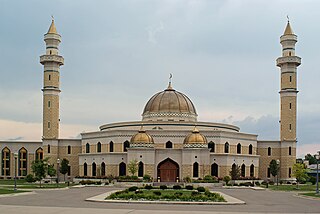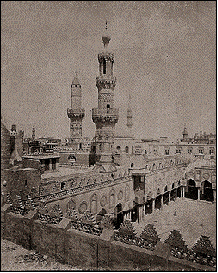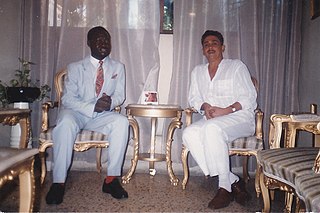Related Research Articles

Jihad is an Arabic word which literally means "exerting", "striving", or "struggling", especially with a praiseworthy aim. In an Islamic context, it can refer to almost any effort to make personal and social life conform with God's guidance, such as internal struggle for knowledge and betterment of the soul, efforts to build a good Muslim community (ummah), and struggle to defend Islam. In non-Muslim societies the term is most often associated with armed conflict.

The Organisation of Islamic Cooperation, formerly the Organisation of the Islamic Conference, is an intergovernmental organization founded in 1969. It consists of 57 member states, 48 of which are Muslim-majority. The organisation claims to be "the collective voice of the Muslim world" and works to "safeguard and protect the interests of the Muslim world in the spirit of promoting international peace and harmony".

A missionary is a member of a religious group who is sent into an area in order to promote its faith or provide services to people, such as education, literacy, social justice, health care, and economic development.
Islamic fundamentalism has been defined as a revivalist and reform movement of Muslims who aim to return to the founding scriptures of Islam. The term has been used interchangeably with similar terms such as Islamism, Islamic revivalism, Qutbism, Islamic activism, but also criticized as pejorative, a term used by outsiders who instead ought to be using more positive terms such as Islamic activism or Islamic revivalism.

Islam is the third-largest religion in the United States (1.34%), behind Christianity (67%) and Judaism (2%). The 2020 United States census estimated that 1.34% of the population of the United States are Muslim. In 2017, twenty states, mostly in the South and Midwest, reported Islam to be the largest non-Christian religion. In 2020, the U.S. Religion Census found there to be 4,453,908 Muslim Americans, or roughly 1.34% of the population.
The World Assembly of Muslim Youth is an international Islamic educational organization whose stated purpose is “preserve the identity of Muslim youth and help overcome the problems they face in modern society”. Reportedly the world's largest Muslim organization, WAMY organizes conferences, symposia, educational workshops and research circles to address youth and students issues, in addition to football tournaments and European Muslim Scouts camps for Muslim youth in Europe. Along with the Muslim World League, it is part of a "worldwide network of largely Saudi-funded groups...promoting Islamic teachings and encouraging Muslims to be more religiously observant, as well as providing interested non-Muslims and recent converts with information about Islam". It maintains satellite chapters in 31 other countries and is affiliated with some 196 other Muslim youth groups on five continents.

The Muslim Students Association, or Muslim Student Union, of the U.S. and Canada, also known as MSA National, is a religious organization dedicated to establishing and maintaining Islamic societies on college campuses in Canada and the United States. It serves to provide coordination, community, outreach and support for affiliated MSA chapters in colleges across North America. Established in 1963, the organization now has chapters in colleges across the continent, and is the precursor of the Islamic Society of North America and several other Islamic organizations. The Muslim Students Association has at times been the subject of scrutiny; for example, the New York Police Department (NYPD) targeted MSAs across several US college campuses for monitoring as part of their Muslim surveillance program.

Pan-Islamism is a political movement which advocates the unity of Muslims under one Islamic country or state – often a caliphate – or an international organization with Islamic principles. Historically, after Ottomanism, which aimed at the unity of all Ottoman citizens, Pan-Islamism was promoted in the Ottoman Empire during the last quarter of 19th century by Sultan Abdul Hamid II for the purpose to prevent secession movements of the Muslim peoples in the empire.

Islam is one of the two largest religions in Nigeria. Nigeria also has the largest Muslim population in Africa. In 2018, the CIA World Factbook estimated that 53.5% of Nigeria's population is Muslim. Islam is predominantly concentrated in the northern half of the country, with a significant Muslim minority existing in the southern region. Most of Northern Nigeria is governed under Sharia law, while the rest of the country is governed under secular law.

Islam is the dominant religion in Egypt, with approximately 90% of Egyptians identifying as Muslims. The majority of Egyptian Muslims are adherents of Sunni Islam, while a small minority adhere to Shia Islam. Since 1980, Islam has served as Egypt's state religion. Due to the lack of a religious census, owing to the alleged undercounting of non-Muslim minorities in Egyptian censuses, the actual percentage of Muslims is unknown; the percentage of Egyptian Christians, who are the second-largest religious group in the country, is estimated to be between 6% and 11% of the population.
The Murabitun World Movement is an Islamic movement founded by Abdalqadir as-Sufi, a branch of the Šāḏilī-Darqāwī Sufi order with communities in Europe, South America, Southeast Asia, and South Africa, where it is officially based. Its heartland is Spain. The number of its followers may amount, according to one estimate, to around 10,000.

The Muslim World League is an international Islamic NGO based in Mecca, Saudi Arabia that promotes what it calls the true message of Islam by advancing moderate values that promote peace, tolerance and love.

Islam in Africa is the continent's second most widely professed faith behind Christianity. Africa was the first continent into which Islam spread from the Middle East, during the early 7th century CE. Almost one-third of the world's Muslim population resides in Africa. Muslims crossed current Djibouti and Somaliland to seek refuge in present-day Eritrea and Ethiopia during the Hijrah ("Migration") to the Christian Kingdom of Aksum. Like the vast majority (90%) of Muslims in the world, most Muslims in Africa are also Sunni Muslims; the complexity of Islam in Africa is revealed in the various schools of thought, traditions, and voices in many African countries. Many African ethnicities, mostly in the northern half of the continent, consider Islam as their traditional religion. The practice of Islam on the continent is not static and is constantly being reshaped by prevalent social, economic, and political conditions. Generally Islam in Africa often adapted to African cultural contexts and belief systems forming Africa's own orthodoxies.
Hispanic and Latino American Muslims also known as Morisco Americans are Hispanic and Latino Americans who are of the Islamic faith. Hispanic and Latino Americans are an ethnolinguistic group of citizens of the United States with origins in Spain and Latin America. Islam is an Abrahamic, monotheistic religion teaching that there is only one God (Allah), and that Muhammad is the last messenger of God. The primary scriptures of Islam are the Quran, the verbatim word of God, and the teachings and normative examples of Muhammad. Muslims believe that Islam is the complete and universal version of a primordial faith that was revealed many times before through prophets including Adam, Abraham, Moses and Jesus, and the Quran in its Arabic to be the unaltered and final revelation of God. The Spaniards took the Roman Catholic faith to Latin America via imperialism and colonialism; Roman Catholicism continues to be the largest, but not the only, religious denomination among most Hispanics. In contrast, the Arabs took Islam to very few Latin American countries such as Mexico, El Salvador, Guatemala and Colombia via post-independence immigration.
AWQAF Africa Muslim Open College is an institution of AWQAF Africa's educational department. It was launched in 2005 to cater for educational needs of the Africans and for people of African origin.

Abdul-Fattah Abu-Abdullah Taiye Ejire Adelabu or simply Sheikh Adelabu, also known as Al-Afriqi (الإفريقي) or Shaykh Al-Afriqi is a Nigeria-born British Muslim scholar, writer, academic, publisher and cleric from Osogbo, capital city of Osun State, Nigeria.

The Ministry of Awqaf of Egypt is one of ministries in the Egyptian government and is in charge of religious endowments. Religious endowments, awqaf, are similar to common law trusts where the trustee is the mosque or individual in charge of the waqf and the beneficiary is usually the community as a whole. Examples of waqfs are of a plot of land, a market, a hospital, or any other building that would aid the community.

Ahmadiyya, officially the Ahmadiyya Muslim Jama'at (AMJ) is an Islamic messianic movement originating in British India in the late 19th century. It was founded by Mirza Ghulam Ahmad (1835–1908), who said he had been divinely appointed as both the Promised Mahdi and Messiah expected by Muslims to appear towards the end times and bring about, by peaceful means, the final triumph of Islam; as well as to embody, in this capacity, the expected eschatological figure of other major religious traditions. Adherents of the Ahmadiyya—a term adopted expressly in reference to Muhammad's alternative name Aḥmad—are known as Ahmadi Muslims or simply Ahmadis.
Kuwait Ministry of Awqaf and Islamic Affairs is a cabinet department of the executive branch of the government of Kuwait dedicated to spreading tolerant Islamic culture. Specifically, it seeks to spread awareness and expand the influence of Islamic faith, Islamic history, and Islamic sciences.
Islamic Education Trust is an Islamic Non-Governmental Organization established on 16th Ramadan 1379AH equivalent to 18 November 1969 and registered with the Federal Government of Nigeria in 1972 situated in Minna, Nigeria.
References
- ↑ AWQAF or AWQAF Africa
- ↑ Al-Itihad Arabic Newspaper, Clifton NJ07015 Number 321 page 7 July 1995
- ↑ Studying With Awqaf Africa
- ↑ [Delab International Magazine, London August 1999]